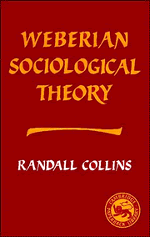6 - Imperialism and legitimacy: Weber's theory of politics
Published online by Cambridge University Press: 01 June 2011
Summary
Weber wrote a great deal about politics, but the general outline of his theory is surprisingly obscure. Apart from Weber's style of exposition, the reason appears to be that the causal dynamics of politics he indicates are not at all what one would expect. Weber's well-known political typologies are all conventionally internal to the state: the three forms of legitimacy, with their accompanying organizational forms of domination, plus the lineup of class, status, and party factions that contend for power. But the one place where Weber (1922/1968:901–40) offers a systematic introduction to politics, his chapter in Economy and Society entitled “Political Communities,” has not been recognized as such. Instead of dealing with the internal affairs of a politically organized society, it devotes most of its attention to apparently subsidiary matters: imperialism and nationalism. But this chapter introduces the longest section of the book (Weber, 1922/1968:901–1372), which considers the state in all its historical forms; the fact that Weber found room here for a discussion of imperialism shows that he considered the topic to have a central importance for the whole of politics.
This sense of incongruity disappears once we get over the received notion that politics is essentially internal to a state. The thrust of Weber's thought is exactly the opposite: that politics works from the outside in, and that the external, military relations of states are crucial determinants of their internal politics.
- Type
- Chapter
- Information
- Weberian Sociological Theory , pp. 145 - 166Publisher: Cambridge University PressPrint publication year: 1986
- 2
- Cited by



